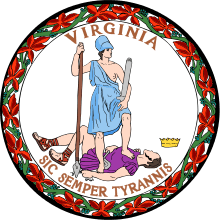Wilson Cary Nicholas
| Wilson Cary Nicholas | |
|---|---|
 Wilson Cary Nicholas, by Gilbert Stuart. 1805. | |
| United States Senator from Virginia | |
|
In office December 5, 1799 – May 22, 1804 | |
| Preceded by | Henry Tazewell |
| Succeeded by | Andrew Moore |
| Member of the U.S. House of Representatives from Virginia's 21st district | |
|
In office March 4, 1807 – November 27, 1809 | |
| Preceded by | Thomas M. Randolph, Jr. |
| Succeeded by | David S. Garland |
| 19th Governor of Virginia | |
|
In office December 1, 1814 – December 1, 1816 | |
| Preceded by | James Barbour |
| Succeeded by | James P. Preston |
| Member of the Virginia House of Delegates | |
|
In office 1788–1789 | |
| Personal details | |
| Born |
January 31, 1761 Williamsburg, Virginia |
| Died |
October 10, 1820 (aged 59) Charlottesville, Virginia |
| Political party | Democratic-Republican |
| Relations |
Brother of George Nicholas Uncle of Robert C. Nicholas |
| Alma mater | College of William and Mary |
Wilson Cary Nicholas (January 31, 1761 – October 10, 1820) was an American politician who served in the U.S. Senate from 1799 to 1804 and was the 19th Governor of Virginia from 1814 to 1816.
Biography
Nicholas was born in Williamsburg, Virginia and later attended the College of William and Mary.
Revolutionary War service
Nicholas served as a lieutenant in the Albemarle County Militia during the American Revolution.[1]
Career
After the war, he was a member of the Virginia House of Delegates 1784–1789 and a delegate to the ratifying convention of 1788 which approved the Federal Constitution.
During the deliberations, on June 6, 1788, Nicholas countered Patrick's Henry's objection that correcting defects in the new national Constitution by way of the Article V convention would be excessively difficult. Said Nicholas: "The conventions which shall be so called will have their deliberations confined to a few points; no local interest to divert their attention; nothing but the necessary alterations. They will have many advantages over the last Convention. No experiments to devise; the general and fundamental regulations being already laid down."[2]
During the years 1794–1800, Nicholas served again in the State house of delegates. He was elected as a Democratic-Republican to the United States Senate to fill the vacancy caused by the death of Henry Tazewell and served from December 5, 1799, until May 22, 1804, when he resigned to become collector of the port of Norfolk 1804–1807. He was elected to the U.S. House of Representatives in the Tenth and Eleventh Congresses and served from March 4, 1807, until his resignation November 27, 1809. Nicholas was chosen to be Governor of Virginia and served in that position 1814–1817.
Nicholas also served as president of the Richmond branch of the Second Bank of the United States. His speculations in western lands put him in serious debt during the Panic of 1819. Having convinced Thomas Jefferson to endorse two of his notes for $10,000 each, he also plunged Jefferson into debt.[3]
Death
He died at Tufton, near Charlottesville, Virginia. Nicholas was interred in the Jefferson burying ground at Monticello, near Charlottesville.
Family
Wilson Cary Nicholas married Margaret Smith (1765–1849) of Baltimore. His brother George was married to Margaret's sister Mary. Margaret and Mary Smith were the sisters of Samuel Smith and Robert Smith.
The children of Wilson Cary Nicholas and Margaret Smith included: Mary Buchanan; Charlotte G.; Jane Hollins; John Smith; and Sidney Smith. Jane Hollins Nicholas (1798–1871) was the wife of Thomas Jefferson's grandson Thomas Jefferson Randolph (1792–1875).
Legacy
Nicholas County, West Virginia was formed in 1843 and named for him. Also named for him is a residence hall at William and Mary.[4]
References
- ↑ The Magazine of Albemarle County History, Volumes 35–36. Albemarle County Historical Society. 1980. p. 143.
- ↑ Eliot's Debates, vol. 3, p. 102, quoted in Russell L. Caplan, Constitutional Brinksmanship, Amending the Constitution by National Convention (New York: Oxford University Press, 1988), p. 139.
- ↑ Herbert E. Sloan, Principle and Interest: Thomas Jefferson and the Problem of Debt (Charlottesville: University of Virginia Press, 2001), p. 219
- ↑ by. "William & Mary – Cabell & Nicholas Halls". Wm.edu. Retrieved 2016-07-02.
External links
 Media related to Wilson Cary Nicholas at Wikimedia Commons
Media related to Wilson Cary Nicholas at Wikimedia Commons
- United States Congress. "Wilson Cary Nicholas (id: N000086)". Biographical Directory of the United States Congress.
- Wilson Cary Nicholas at Find a Grave
- Archival Records
| United States Senate | ||
|---|---|---|
| Preceded by Henry Tazewell |
U.S. Senator (Class 2) from Virginia December 5, 1799 – May 22, 1804 Served alongside: Stevens T. Mason, John Taylor, Abraham B. Venable |
Succeeded by Andrew Moore |
| United States House of Representatives | ||
| Preceded by Thomas M. Randolph, Jr. |
Member of the U.S. House of Representatives from Virginia's 21st congressional district March 4, 1807 – November 27, 1809 |
Succeeded by David S. Garland |
| Political offices | ||
| Preceded by James Barbour |
Governor of Virginia December 1, 1814 – December 1, 1816 |
Succeeded by James P. Preston |

